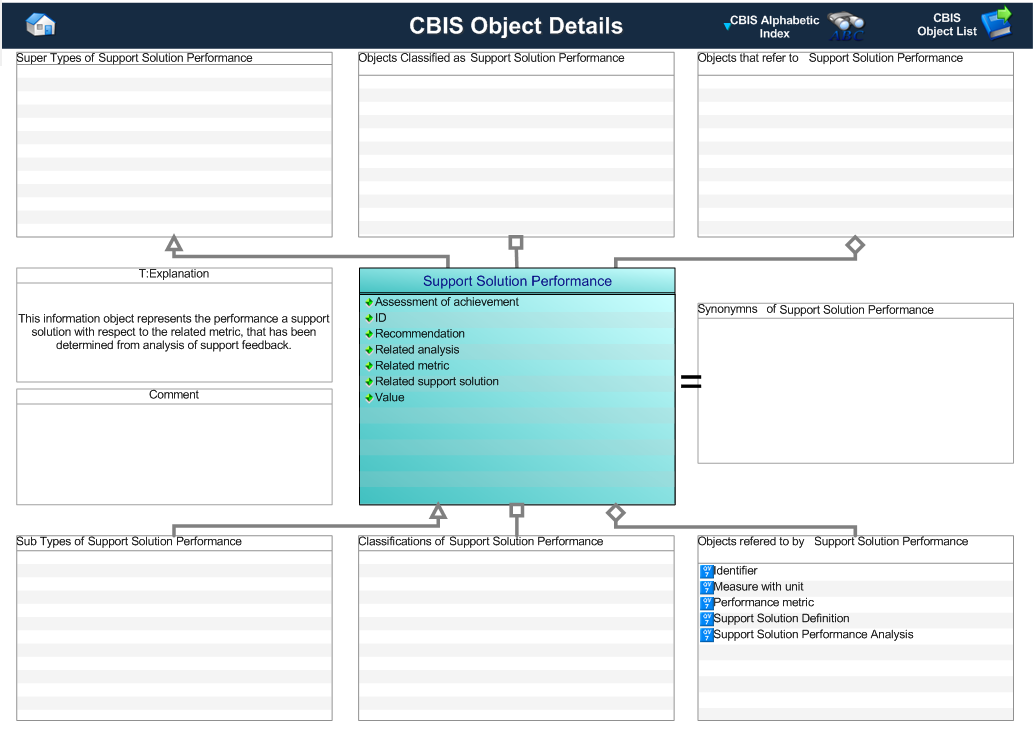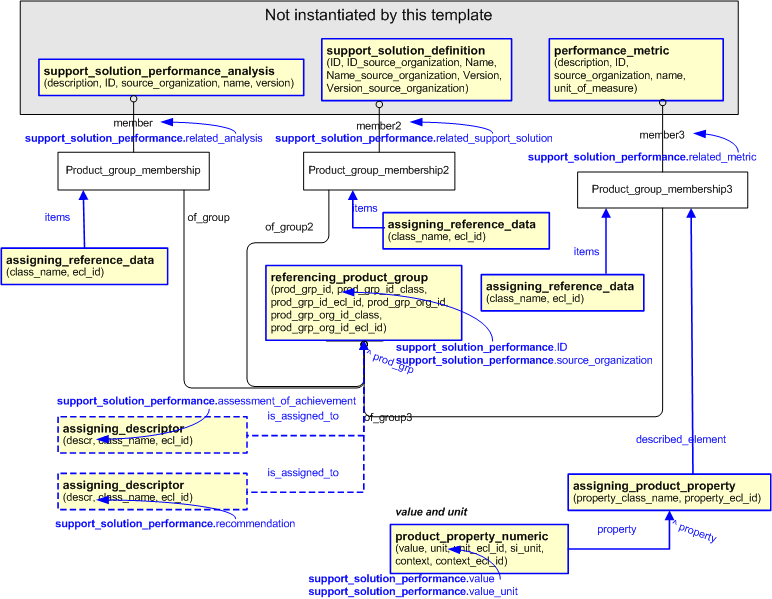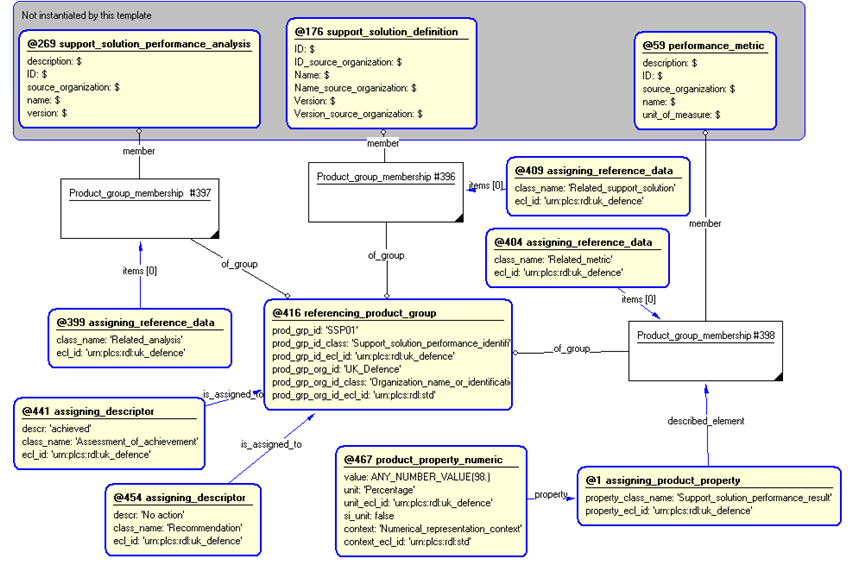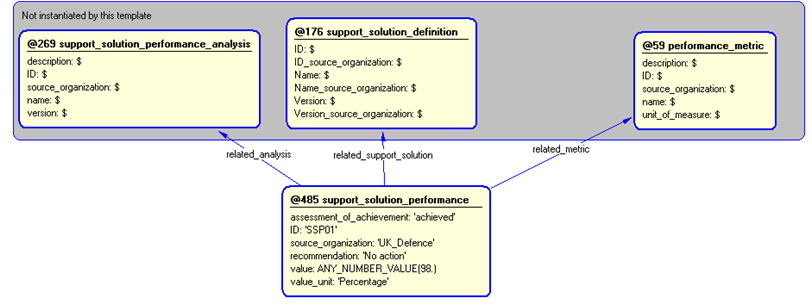Template:— support_solution_performance (sup_sol_perf)
Context:— UK_Defence |
Date: 2009/04/17 12:06:38
Revision: 1.3
|
This section specifies the template support_solution_performance.
NOTE
The template has been defined in the context of
UK_Defence.
Refer to the business context for details of related templates.
NOTE
An explanation of a template and the associated instantiation path is
provided in the
Template overview
section.
This template describes how to represent the performance a support solution with respect to the
related metric, that has been determined from analysis of support feedback.
This information object represents an analysis that has been performed on support feedback for the purposes of determining
whether specific performance metrics have been met.
The results of each Performance Analysis are recorded by means of relationships from the information objects that
are generated by the
analysis and the Performance Analysis object itself.
Figure 1 — Graphical Representation for Business Object Support Solution Performance
Support Solution Performance:
|
Attribute name
|
Attribute description
|
Attribute type
|
Optionality
|
| Assessment of achievement |
This is a qualitative or quantitative assessment of whether the related metric has been achieved. |
intrinsic |
Optional |
| ID |
The identifier of the support solution performance result. |
intrinsic |
Mandatory |
| Recommendation |
This is a recommendation that may be made subsequent to deriving the performance result.
This may include recommendations for design changes, support solution definition changes or re-analysis
of support components.
|
intrinsic |
Optional |
| Related analysis |
This is the reference to the analysis that produced the result. |
Relationship to Support Solution Performance Analysis |
Mandatory |
| Related metric |
This is the reference to the performance metric for which this result has been determined. |
Relationship to Performance metric |
Mandatory |
| Related support solution |
This is the reference to the support solution for which the support performance result has been derived |
Relationship to Support Solution Definition |
Mandatory |
| Value |
This is the value of the support solution performance result. |
Relationship to Measure with unit |
Mandatory |
Table 1 — Support Solution Performance attribute details
The EXPRESS-G diagram in
Figure
2
shows the templates and EXPRESS entities that are required
to represent the template
"support_solution_performance".
The text highlighted in blue shows the template parameters.
Figure 2 — An EXPRESS-G representation of the Information model for support_solution_performance
The graphic for the template to be used in other EXPRESS-G diagrams
is shown in Figure
3
below.
Figure 3 — The graphical representation of the support_solution_performance template
The following input parameters are defined for this template:
This is a qualitative or quantitative assessment of whether the related metric has been achieved.
assigning_descriptor template should not be instantiated.
The identifier of the support solution performance result.
The identifier of the organization responsible for identifying the support solution performance result.
This is a recommendation that may be made subsequent to deriving the performance result.
This may include recommendations for design changes, support solution definition changes or re-analysis
of support components.
This is the reference to the analysis that produced the result.
This is the reference to the performance metric for which this result has been determined.
This is the reference to the support solution for which the support performance result has been derived.
This is the value of the support solution performance result.
The class name corresponding to the unit of measure for the support solution performance result.
The following classes and their sub-classes can be used:
The following reference parameters are defined for this template:
Allow the
Product_group
entity instantiated in this path to be referenced when this template is used.
Note: The
Product_group
entity can be referenced in a template path by:
%^target = $support_solution_performance.support_solution_performance%
where
target
is the parameter to which the
Product_group
is bound.
%^target = $support_solution_performance.support_solution_performance_metric%
The following parameter combinations specify a uniqueness constraint:
Unique constraint: Support_solution_performance
The instantiation path shown below specifies the entities that are to be
instantiated by the template.
A description of templates and the syntax for the instantiation path is
provided in the
Templates Help/Information section.
-- instantiate product group /
referencing_product_group(
prod_grp_id=@ID,
prod_grp_id_class='Support_solution_performance_identifier',
prod_grp_id_ecl_id='urn:plcs:rdl:uk_defence',
prod_grp_org_id=@source_organization,
prod_grp_org_id_class='Organization_name_or_identification_code',
prod_grp_org_id_ecl_id='urn:plcs:rdl:std')/
-- assign ref parameter %^support_solution_performance = $referencing_product_group.prod_grp%
-- link to related_analysis Product_group_membershipProduct_group_membership.member ->
@related_analysisProduct_group_membership.of_group ->
^support_solution_performance
%^related_analysis_relationship =
Product_group_membership%
/
assigning_reference_data(
items=^related_analysis_relationship,
class_name='Related_analysis',
ecl_id='urn:plcs:rdl:uk_defence')/
-- link to support_solution_definition Product_group_membershipProduct_group_membership.member ->
@related_support_solutionProduct_group_membership.of_group ->
^support_solution_performance
%^related_support_solution_relationship =
Product_group_membership%
/
assigning_reference_data(
items=^related_support_solution_relationship,
class_name='Related_support_solution',
ecl_id='urn:plcs:rdl:uk_defence')/
-- link to related_metric Product_group_membershipProduct_group_membership.member ->
@related_metricProduct_group_membership.of_group ->
^support_solution_performance
%^related_metric_relationship =
Product_group_membership%
/
assigning_reference_data(
items=^related_metric_relationship,
class_name='Related_metric',
ecl_id='urn:plcs:rdl:uk_defence')/
-- instantiate support solution performance result /
assigning_product_property(
property_class_name='Support_solution_performance_result',
property_ecl_id='urn:plcs:rdl:uk_defence',
described_element=^related_metric_relationship)/
%^property = $assigning_product_property.property%
-- instantiate Batch quantity /
product_property_numeric(
value=@value,
unit=@value_unit,
unit_ecl_id='urn:plcs:rdl:uk_defence',
si_unit='false',
context='Numerical_representation_context',
context_ecl_id='urn:plcs:rdl:std',
property=^property)/
-- [ optional assessment_of_achievement] /
assigning_descriptor(
descr=@assessment_of_achievement,
class_name='Assessment_of_achievement',
ecl_id='urn:plcs:rdl:uk_defence',
is_assigned_to=^support_solution_performance)/
-- [ optional recommendation] /
assigning_descriptor(
descr=@recommendation,
class_name='Recommendation',
ecl_id='urn:plcs:rdl:uk_defence',
is_assigned_to=^support_solution_performance)/
The instance diagram in Figure
4
shows an example of the EXPRESS entities and templates that are instantiated by the template:
/support_solution_performance(assessment_of_achievement='achieved', ID='SSP01', source_organization='UK_Defence', recommendation='No actionl', related_analysis='@269', related_metric='@59', related_support_solution='@176', value='98', value_unit='Percentage')/
(an illustration of the consolidated support_solution_performance template is shown in
Figure
5 below.)
Figure 4 — Entities instantiated by support_solution_performance template
The instance diagram in
Figure
5
shows the graphic symbol for the template that is to be
used in other instance diagrams. The example template is:
/support_solution_performance(assessment_of_achievement='achieved', ID='SSP01', source_organization='UK_Defence', recommendation='No actionl', related_analysis='@269', related_metric='@59', related_support_solution='@176', value='98', value_unit='Percentage')/
Figure 5 — Instantiation of support_solution_performance template
Characterizations
No common characterizations of the template
support_solution_performance
have been identified. However, the ISO 10303-239 EXPRESS model
may enable other assignments to the entities instantiated by the template.




